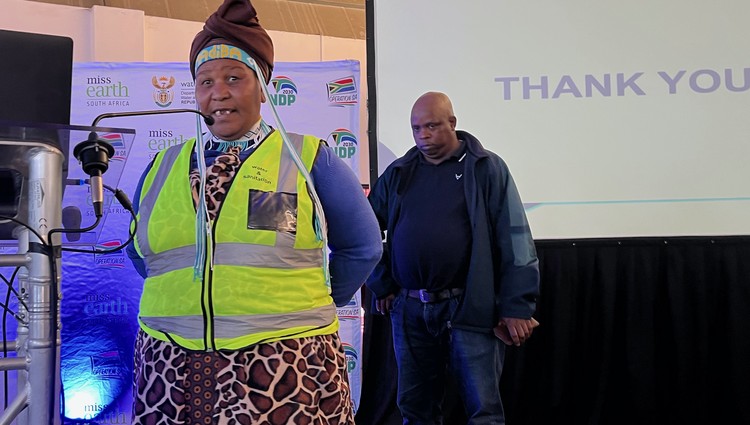
10 October 2022
In Siyahlala in Dunoon, families have to cross a highway to relieve themselves in an open field, Thokoza Mxotwa told government officials come to campaign against vandalism of sanitation and water infrastructure. Behind her is community activist Sinethemba Matomela. Photo: Peter Luhanga
A deputy minister who visited Dunoon in Cape Town on Friday to urge residents not to vandalise essential infrastructure was told that in most of Dunoon there is no infrastructure to vandalise.
As part of an anti-vandalism campaign launched by the national government and the City of Cape Town earlier this year, Deputy Minister of Water and Sanitation Dikeledi Magadzi visited Dunoon on 7 October to speak to residents about the impact of theft and vandalism of water and sanitation infrastructure on essential services.
Provincial head of the department, Zanele Bila-Mupariwa was also there. Those vandalising water and sanitation infrastructure were destroying residents’ dignity, Bila-Mupariwa said. “The infrastructure doesn’t belong to the municipality.”
But community activist and South African National Civic Organisation branch chairperson Sinethemba Matomela said ten of the 37 informal settlements in Dunoon have no toilets or no drinking water or neither, and infrastructure in many of the other informal settlements is inadequate.
Matomela said this was in spite of residents’ pleas for basic services.
He listed some examples:
He said Siyahlala and Ekuphumuleni informal settlements both had low water pressure, to the extent that residents had to wait until 10pm before any water flowed out their taps. “These are old informal settlements and the issue of low water pressure is not resolved.”
He said the anti-vandalism campaign was welcome, but it was insulting to lecture “about water is life” to people without water.
Thokoza Mxotwa, who has been living in Siyahlala informal settlement for 17 years, told the government officials how people had to cross the busy N7 to relieve themselves in an open field.
Mxotwa said when the sewerage infrastructure servicing the formal areas of Dunoon was blocked, the sewage spilled out and flowed past their shacks. “We are getting sick because of filthy living conditions,” she said. “We plead with the deputy minister to ask the top government structures to address our living conditions. They must look into it.”
Bila-Mupariwa said the municipality was doing what they could. “We can see the city is working, we can see the city is unblocking drains, this money could have been diverted to create swimming pools, could have been allocated to create recreational areas.”
Magadzi said the national department was working with the municipality to provide water reticulation. “We want to find out what are their challenges, then we can assist with those.”
She encouraged people to assist the municipality by reporting sewer spills.
Deputy Water and Sanitation Minister Dikeledi Magadzi visited Dunoon. Behind her are deputy director-general Lindiwe Lusenga and Dunoon ward councillor (ANC) Meisie Makuwa. Photo: Peter Luhanga
The City of Cape Town’s acting Mayco member for water and sanitation, Siseko Mbandezi, said some homeowners had upgraded their RDP houses into blocks of flats for rent, but did not pay rates for the extra services required on their properties. He said this put a strain on city infrastructure.
“They earn rental revenue but don’t pay municipal rates,” said Mbandezi.